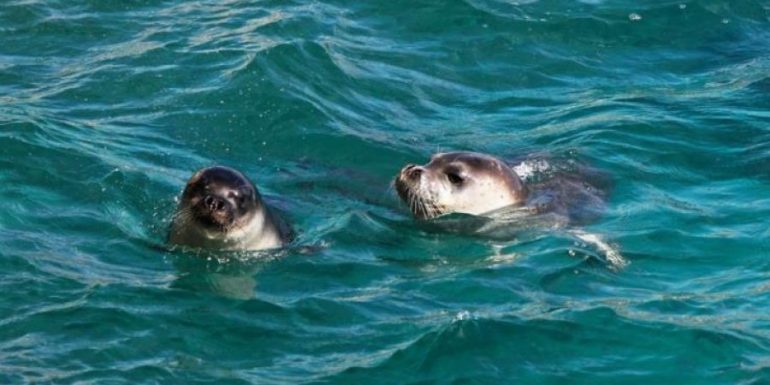Two seals of the rare species Monachus - monachus, which have not yet completed one month of life, were born in the area of the sea caves in Ayia Napa, Haris Nikolaou, Officer at the Ministry of Agriculture, Rural Development and Environment, told KYPE, appealing to the public to do not harass these animals and let them grow up safely.
Mr. Nikolaou, who is in charge / coordinator of the field work of the Mediterranean Seal Monitoring Plan in Cyprus, described as "very important the fact that in recent weeks we had two births of this seal in the same cave, in Ayia Napa. The birth of these two little ones, burdens us with greater responsibility because the animals chose to breed in the highest tourist area of Cyprus, in Ayia Napa and the nuisance will be given in this area ".
"We must be constantly on the alert so that there are no incidents of animal harassment, which could lead to unpleasant developments," he said. "Seals are mammals, intelligent and wild animals and as such we must treat them, since they live in the open environment and can manage the dangers very well", he said and noted that "in their effort to find food, they also approach fishermen at sea".
However, said Mr. Nikolaou, "despite the fact that seals are cute animals, people should not try to approach them, photograph them, feed them or anything else. It is very important that the animals are not harassed, so that we continue to have them with us because there is a great risk in case they feel the harassment from the public, to leave their caves and move to another area.
Answering a relevant question, he said that "it is wrong to think that Cyprus has many coastal caves and therefore there are many options for animals. "A special cave for the animals must meet certain conditions, ie safety during bad weather or rough seas and there must be an ideal beach in the cave so that the seal can give birth and breastfeed its young for four months".
Such caves, he noted, "are very limited in Cyprus and exist only in the area of Ayia Napa, in the area of Governors Beach - Agios Georgios Alamanou, in Akrotiri and in Akamas. "The options for the animals for breeding are not many and that is why they chose the area in Ayia Napa which is ideal".
Asked whether the extreme weather phenomena observed in recent days in Cyprus affected the seals, Haris Nikolaou replied that "animals have terrible adaptations. For the last ten days or so, winds of 8-9 Beaufort have been blowing in the area and the seals have adapted very well, "he said, noting that" precisely because the shelter was ideal, the animals were protected and were not in any danger. "
He added that "in case there is a storm and the wave reaches the beach, the mothers will stand in front of their little ones and protect them like breakwaters. The newborns started to come out of the cave, after swimming from the 2nd and 3rd day of their life, but they are not so experienced and strong that they can swim alone and for a long time to avoid some dangers ".
For this very reason, he continued "we recommend the people to be careful, especially in this area of Ayia Napa, because in case the newborn is scared he will go out of the safety of his cave, get tired and drown or go to another beach and die of starvation or other dangers. "All the seal breeding caves, and this one with the two newborns, are monitored by a 24-hour camera system, and we recommend the public to stay on the cliffs, to watch the animals but not to enter the sea and try to approach them".
To another question, Mr. Nikolaou answered that "with the two births, the animals that we watch today and have data amount to 21. Regarding the occupied areas of Cyprus we have a picture of the seals, which are monitored, we see that they move and can to leave Cyprus and go to Lebanon, Israel, Turkey and other countries, after traveling and traveling long distances ".
He added that "the measures taken by the Ministry of Agriculture to protect this animal seem to have borne fruit. What we want is to implement these measures to keep the animals in Cyprus and to continue to breed safely on our island because "as he explained" if the animals feel safe they will remain and reproduce "
